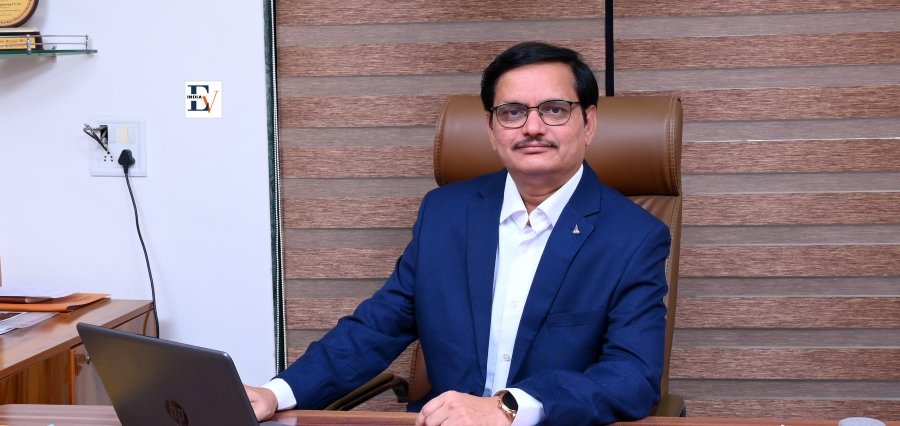Mr. Prakash Sulakhe’s journey into the education industry was not a mere business decision—it was a calling born from observation, experience, and a deep sense of purpose. Early in his professional life, he recognised a significant disconnect between what was taught in classrooms and what the real world demanded from graduates. Theoretical knowledge often fell short when confronted with industry requirements, and this gap became increasingly evident during his involvement in various technical projects. Rather than just identifying the problem, Mr. Sulakhe took it upon himself to address it.
His first-hand exposure to educational repair works gave him a unique perspective on the infrastructural shortcomings and the lack of application-oriented tools in academic institutions. With a passion for making a difference, he developed industrial-standard laboratory equipment such as CNC Machine Trainers and Hydraulic and Pneumatic Workstations. These products, crafted with precision and purpose, were not only aesthetically designed but were also rich in practical value, earning acclaim across academic circles. The encouraging feedback bolstered his confidence, inspiring him to dedicate himself entirely to the education sector.
Today, Mr. Sulakhe stands as a beacon of innovation and commitment in educational technology. His organisation’s trajectory is a testament to how passion, quality, and a student-first approach can transform an idea into a movement. With a vision anchored in bridging the classroom-industry divide, he has led a revolution that empowers educators and institutions to better prepare students for the challenges of tomorrow.
Foundations Built on Leadership Values
According to Mr. Sulakhe, leadership is as critical to business success as a pilot is to an aircraft. He firmly believes that to bring meaningful change and innovation in any industry, especially education, one must possess and practice strong leadership values. For him, leadership is about engaging with every stakeholder, identifying their challenges, and offering actionable solutions that elevate the collective experience.
Innovation is not just about technology—it is also about understanding the mindset of educators, complying with academic standards, and crafting solutions that blend the two harmoniously. Mr. Sulakhe’s approach has consistently prioritised creating products that resonate with educators. Whether it’s advanced CNC Trainers, CIM setups, or IoT-based mechatronics training kits, his focus remains on designing user-friendly, intuitive tools that support students and lab technicians alike.
By personally involving himself in the development process and actively engaging with the academic community, Mr. Sulakhe ensures that every innovation his organisation offers is rooted in actual needs and future-ready technologies. This hands-on leadership ensures a continuous cycle of relevance, innovation, and value addition.
Staying Ahead in an Evolving Landscape
The academic world is rapidly changing, and staying relevant means anticipating the evolving needs of educators, students, and institutions. Mr. Sulakhe’s approach is both proactive and people-centric. He understands that the academic calendar is packed, leaving little room for spontaneous adaptation. This is why his organisation makes it a priority to consistently engage with faculty, administrators, and technicians to understand their needs.
By addressing pain points such as training deficiencies, equipment maintenance, and technological upgrades, his solutions bring practical value to institutions. It’s not just about selling products; it’s about forming partnerships in education, where the value is co-created. His strategy of solving ground-level problems and enabling growth through value addition has kept his brand ahead in a competitive and ever-shifting educational technology market.
Adapting to Learners’ Evolving Needs
Change has been the only constant in Mr. Sulakhe’s journey. His company has never shied away from embracing new technologies. Back in 1999, when industries began embracing automation, he identified the rising relevance of PLC technology and promptly developed India’s first affordable PLC Trainer Kit. Recognising the global shift toward CNC machines, he developed CNC Trainer Machines locally, making them accessible to Indian institutions.
Moreover, he saw the potential in computer-based learning long before it became mainstream. In the early 2000s, he introduced PC-based data acquisition systems, enhancing the practical learning experience for students. This innovative streak continued into robotics and automation when, in 2006, his team developed India’s first in-house six-axis articulated robot—an achievement that cemented their role as pioneers in educational technology.
Through these efforts, Mr. Sulakhe ensured that his organisation didn’t just react to technological changes—they anticipated them and led the way in their adoption within the education system.
Recognition as a Catalyst for Growth
While personal recognition was never the goal, awards and accolades have played a significant role in Mr. Sulakhe’s journey. He acknowledges that India, being a vast and diverse nation, often lacks robust systems for recognising and highlighting innovation. However, the awards his organisation has received have given it credibility, visibility, and a sense of responsibility.
Recognition boosts morale—not just personally, but across the team. It instils pride, enhances motivation, and reinforces their belief in the mission. For Mr. Sulakhe, awards are not an endpoint but a reminder of the higher standards they are now expected to uphold. They serve as encouragement to pursue greater value for the educational community.
Collaboration as a Growth Enabler
Mr. Sulakhe believes that the key to staying technologically relevant is collaboration. In an ecosystem as vast and diverse as education, one cannot operate in isolation. His approach involves creating a community of like-minded technocrats, educators, and industry professionals who are collectively invested in improving educational outcomes.
With the rising importance of data science, AI, and interdisciplinary learning, his organisation has forged international collaborations with companies like POCKET NC and WAZER from the USA. These partnerships have enabled Indian institutions to access cutting-edge technology for educational and research purposes—technology that was previously unavailable in the country.
Such collaborations ensure that Indian education stays globally competitive and that students are exposed to world-class learning tools from the outset.
Sustaining Team Morale During Adversity
The COVID-19 pandemic was an unprecedented challenge that tested the resilience of individuals and organisations worldwide. For Mr. Sulakhe, this period was a defining moment. As educational institutions closed and revenues plummeted, the logical response might have been downsizing or cost-cutting. Instead, he chose to invest in people.
Neither did he lay off a single employee, nor did he reduce salaries. He implemented a 10% salary raise to instil confidence and show his commitment to his team. Simultaneously, they pivoted to developing advanced industrial products, creating a new avenue of relevance and sustainability. This gesture of trust and leadership reinforced a culture of loyalty, innovation, and shared purpose within the organisation.
Challenges in Today’s Professional Education
In Mr. Sulakhe’s view, the primary challenge faced by professional education today is its misalignment with industry trends. Academic institutions often lag in adopting the latest technologies or integrating practical skill-building into their curricula. Meanwhile, industries need skilled professionals who are ready to contribute from day one.
He advocates for a collaborative model where academic and industrial entities work closely to design training programs that are not only aligned with current trends but also prepare students for the future. For him, professional education should lead to employment, and industrial training should facilitate career growth—a dual responsibility that demands synchronisation between both sectors.
Advice to Future Education Leaders
Mr. Sulakhe views educational leadership as a form of nation-building. He urges emerging leaders to pursue this path with passion, integrity, and a deep commitment to creating impact. It’s not just about developing new tools or technologies but about democratizing access to quality education.
He emphasises the need for low-cost, scalable solutions that can penetrate rural regions and empower underserved communities. According to him, the leaders of tomorrow must be forward-thinking, adaptable, and deeply empathetic to the needs, desires, and pain points of the education sector. Digital transformation, he adds, will be a key enabler in this mission.
SMART LABS: Vision and Impact
Mr. Sulakhe’s recently published book, “SMART LABS FOR SMARTER ENGINEERS,” encapsulates his decades of experience and offers a blueprint for transforming traditional engineering labs. Launched alongside notable dignitaries like Goa CM Mr. Pramod Sawant and MP Hema Malini, the book serves as a comprehensive guide for educational institutions.
It provides detailed insights into designing smart labs, selecting the right equipment, and creating immersive learning environments. With real-world case studies, layout plans, and curated equipment lists, the book is both a practical tool and a visionary manifesto for educators aiming to elevate the quality of engineering education.
Vision for 2025 and Beyond
As we progress into 2025, Mr. Sulakhe’s vision remains firmly focused on creating future-ready labs that balance affordability with excellence. He envisions an ecosystem where engineers are not only technically competent but also digitally empowered. His mantra, “Advancing Education to Create Future-Ready Labs with Affordable Excellence,” is more than a slogan—it’s a guiding principle.
He believes that the engineers of tomorrow must be nurtured in environments that mirror real-world challenges. His upcoming projects aim to integrate AI, automation, and data science more deeply into academic infrastructure, ensuring that Indian institutions remain globally competitive and locally impactful.
Through perseverance, purpose, and an unrelenting drive for innovation, Mr. Prakash Sulakhe continues to redefine the landscape of educational technology in India. His journey is not only an inspiration but a roadmap for others who aspire to create meaningful change in education.
Read Also : DSB International School: A Legacy of Excellence, Innovation and Inclusivity





